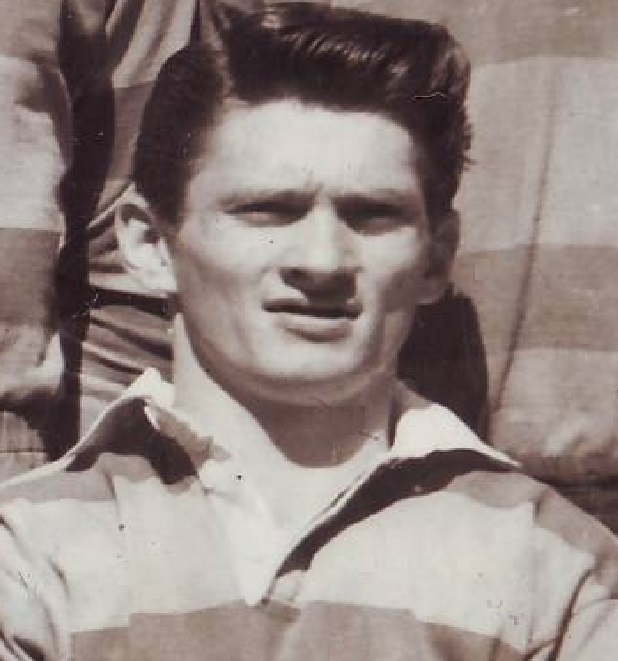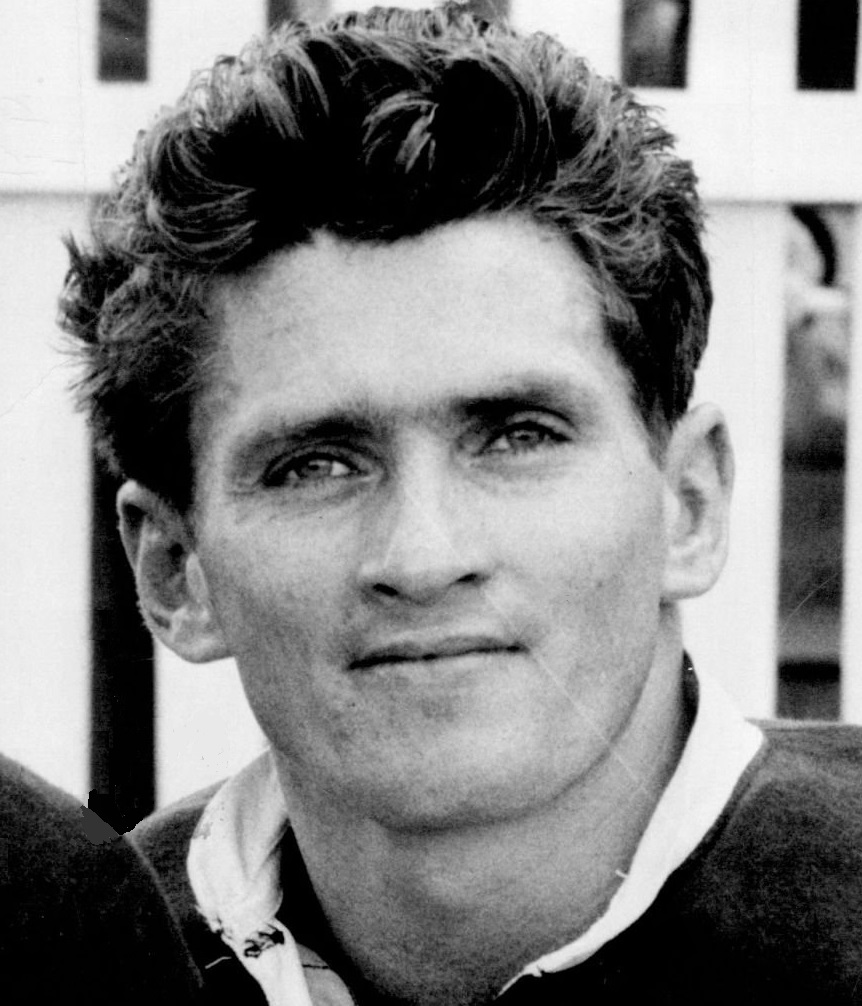______Warning: Aboriginal and Torres Strait Islander readers are advised that this story contains the name and image of a deceased Indigenous person.
Robert Henry Honeysett was born at Condobolin/Wiradjuri in 1934 of Indigenous heritage. His parents were Charles Naden (from his mother’s maiden name, later changed to Honeysett) and Maude Kennedy. Bob had two older siblings in Cecil and Doreen. The family lived at Euabalong West/Wiradjuri where his father Charles was employed as a fettler for the NSW Railways. Bob and his sister Doreen were champion runners and repeatedly won sprinting events at Condobolin/Wiradjuri competing against children who were much older than them.

Bob was first introduced to Rugby League while attending Cleveland Street High School, and played his junior football for the South Sydney Fernleigh Club, under the guidance of his neighbour and life-long friend in Arthur ‘Bully’ Dunne. In 1953 he represented South Sydney in their President’s Cup side, who won the competition after defeating St. George in the final by six-four, which was played at Leichhardt Oval, Lilyfield/Wanngal. Souths then graded him in 1953, but he didn’t make his club debut until the last two games of the season, which were the Preliminary Final against St. George in third grade and the Grand Final against the same opposition. The Rabbitohs won the Preliminary Final by 6-5 to force a Grand Final against the Dragons. The third grade Grand Final was played as a curtain raiser to the representative fixture between Sydney against Brisbane at the Sydney Cricket Ground, Moore Park/Gadigal/Bidjigal. It was a tight game throughout played in unsettled weather with occasional showers, which finished nine-all after normal time, and an extra twenty minutes was needed to decide the premiership. Souths fullback Alan Flockton kicked the winning goal in extra-time to give the Rabbitohs an 11-9 victory.
Honeysett started the 1954 season in third grade, and in round four was promoted to reserve grade. He made his first grade debut in round seven of that season against Parramatta, which was played at Cumberland Oval, Parramatta/Burramattagal. Bob was selected on the wing in this match and scored a try on debut in which Souths won by 18-11. This was his only game played during the year in the top grade.
He was a regular member of the famous 1955 Premiership winning team playing in 18 games and scoring nine tries during the season. But unfortunately, a broken hand in a Semi-Final against St. George prevented him from playing in the Grand Final. He was tackling Dragons winger Tommy Ryan when the incident happened and was replaced by Malcolm Spencer in the Grand Final against Newtown, which the Rabbitohs won by 12-11, after famously winning every game from round 12 onwards to clinch the premiership.
At Souths, Bob had many mates and he was good friends with Bernie Purcell and Clive Churchill. Bernie had married a local girl Monica Cotton whose father owned a paper-shop on the corner of Crown Street and Foveaux Street. Monica’s sister Patricia married John Cottee and he also played for Souths. Their brother Ted was a first-class cricketer who played for Paddington and later Cronulla. At that time, Clive Churchill ran a petrol station on Anzac Parade at Kensington/Bedegal.
In 1956, Bob played in 16 first grade games, scoring six tries, and was part of the team which lost the Preliminary Final to Balmain by 36-33. He also represented City Seconds in that year, scoring a try, Sydney against the touring Maoris, also scoring a try, and New South Wales in game one against Queensland.
In the same year the owners of the ‘Clock’ Hotel wanted the young couple and Bob’s in-laws out of their home so they could re-develop the hotel. They offered his father-in-law some money, but he chose to move house instead. Both families moved to Greenwich/Cammeraygal on the lower north shore, which was part of the North Sydney/Cammeraygal district. This created a problem for Honeysett owing to the residential rule which was in place at the time, where players had to play for the district at which they resided. After unsuccessfully approaching Souths for help and guidance, he decided to register a family friend’s address in Boronia Street, Kensington/Bedegal, as his residency. All went well until a sports journalist observed him catching the train to work every morning from Wollstonecraft/Cammeraygal and reported it to the New South Wales Rugby League. So, after playing in 52 first grade games for the Rabbitohs and scoring 25 tries, the League forced him to play for North Sydney in 1958, where he was reunited with Greg Hawick. In 1959 he was captain of Norths and midway through the season was leading the Sun-Herald Best and Fairest Players Award until getting injured. In the same year he also captained City, scoring two tries, and played for New South Wales in games three and four of the interstate series. He captained the State in game three of that year.
In 1960 he received offers to play at Dorrigo, Oberon and Queensland but finally signed as captain-coach of Young in country New South Wales for two years. In that year the New South Wales Rugby League introduced a transfer scheme for players. The North Sydney Club placed a £3,000 fee on Bob’s transfer, which was beyond the finances of any small country town club at that time. Young appealed to the New South Wales Rugby League and the fee was reduced to £900. He represented Riverina that year as captain against the French touring side, scoring a try in the match.
In 1962 he joined the Wagga Magpies and was selected as a five-eighth in the Country team coached by Phil Jackson and led by Tony Paskins, who defeated a star-studded City team by 18-8. He played for Wagga Magpies until 1964, when he was joined by Arthur Summons at the club.
Bob and Dorothy Honeysett had five strapping boys and they all played Rugby League. The second oldest son, Wayne Honeysett, was selected to play for New South Wales Schoolboys against Queensland Schoolboys in 1973, which included Steve Mortimer as a member of the team. After settling down in Wagga Wagga/Wiradjuri, Bob worked at the Wagga Leagues Club. He became the assistant to the manager Alan Staunton and after Alan’s death in a motor accident the Club offered the management to Arthur Summons as an inducement to get him to Wagga Magpies. Bob was a Riverina selector for a couple of years after hanging up his boots. After resigning from the Leagues Club he was the licensee of the Union Club Hotel and then the Astor Hotel in Wagga Wagga/Wiradjuri before going into partnership with Doug Cameron, an ex-Easts player, in a hotel at West Tamworth/Kamilaroi-Gomeroi.

Bob and his wife then moved to Merimbula/Djiringanj-Thaua on the South Coast where their son Wayne Honeysett worked for the Westpac Bank and played League for the local team. Bob worked at the Tura Beach Country Club and Dot at the Merimbula Bowling Club. They later moved to Gorokan/Darkinjung where Bob ran a newsagency and Dot was a bar manager at the Gorokan Masonic Club. They moved to Macquarie Shores Retirement Village at Doyalson North/Darkinjung after retiring from work. In 2014, Bob was diagnosed with prostate cancer which penetrated into his bones. He later suffered a mild stroke which made it difficult for his sister Doreen to care for him at home. He passed away on 5 December 2017 at Bethshan Nursing Home, Wyee/Awabakal (on the Central Coast), from prostate cancer at the age of 84.
Despite being forced to leave Souths and play for Norths and other Country clubs, Bob was always a true Rabbitoh through and through. When Souths were expelled from the NRL competition his whole family marched in both rallies in 2000 and 2001, and donated money to their cause. They also attended games against the American Tomahawks and Lebanon in 2000, which were played at Redfern Oval, Redfern/Gadigal.
Special thanks to John Dean, Bob’s brother-in-law, for his contribution.






















































